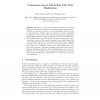Free Online Productivity Tools
i2Speak
i2Symbol
i2OCR
iTex2Img
iWeb2Print
iWeb2Shot
i2Type
iPdf2Split
iPdf2Merge
i2Bopomofo
i2Arabic
i2Style
i2Image
i2PDF
iLatex2Rtf
Sci2ools
JSSPP
2009
Springer
2009
Springer
Contention-Aware Scheduling with Task Duplication
Scheduling a task graph onto several processors is a trade-o’¼Ć between maximising concurrency and minimising interprocessor communication. A technique to reduce or avoid interprocessor communication is task duplication. Certain tasks are duplicated on several processors to produce the data locally and avoid the communication among processors. Most algorithms using task duplication are for the classic model, which allows concurrent communication and ignores contention for communication resources. The recently proposed, more realistic contention model introduces contention awareness into task scheduling by assigning the edges of the task graph to the links of the communication network. It is intuitive that scheduling under such a model bene’¼üts even more from task duplication. This paper proposes a contention-aware task duplication scheduling algorithm, after investigating how to use task duplication in the contention model. An extensive experimental evaluation demonstrates the signi’¼...
Distributed And Parallel Computing | Interprocessor Communication | JSSPP 2009 | Task Duplication | Task Graph |
Related Content
| Added | 27 May 2010 |
| Updated | 27 May 2010 |
| Type | Conference |
| Year | 2009 |
| Where | JSSPP |
| Authors | Oliver Sinnen, Andrea To, Manpreet Kaur |
Comments (0)

